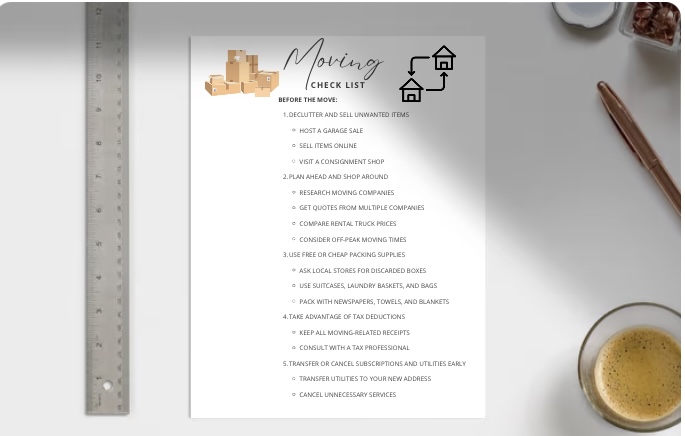Smart Ways to Save Before and After Moving
Are you feeling overwhelmed by the costs of moving to a new home? Worrying about how to manage your expenses both before and after the move?
With the excitement of moving out as well as moving in comes the stress and busy schedule. There are countless things to coordinate when settling into a new home. You probably have a long checklist, from getting your keys to setting up internet and cable. Plus, there’s the deep cleaning to do before bringing in your furniture and belongings.
Before The Move
Smart Ways to Save Before and After Moving
Moving to a new home is an exciting adventure, but it can also be a bit overwhelming, especially when it comes to managing your finances. Whether you’re preparing for the big move or settling into your new place, there are plenty of ways to save money and ease the transition. Here are some friendly tips to help you keep your budget in check both before and after your move.
Whether you are looking in west philly apts for rent or a home on the beach in Florida, there are plenty of ways to save money and ease the transition. Here are some friendly tips to help you keep your budget in check both before and after your move.
1. Declutter and Sell Unwanted Items
Take this opportunity to declutter your home. Not only will you have fewer items to pack, but you can also make some extra cash by selling things you no longer need. Host a garage sale, sell items online, or take them to a consignment shop. Less stuff means lower moving costs!
2. Plan Ahead and Shop Around
Start planning your move well in advance. Research moving companies and get quotes from several to find the best deal. Don’t forget to ask about any hidden fees! If you’re doing a DIY move, compare rental truck prices and consider moving during off-peak times to save money.
3. Use Free or Cheap Packing Supplies
Why spend money on boxes and packing materials when you can get them for free? Check with local stores for discarded boxes, or use items you already have, like suitcases and laundry baskets. For packing materials, old newspapers, towels, and blankets can do the trick.
4. Take Advantage of Tax Deductions
If your move is job-related, you might be eligible for eligible for tax deductions on moving expenses. Keep all your receipts and consult with a tax professional to see if you qualify. This can help you get a nice refund come tax season.
5. Transfer or Cancel Subscriptions and Utilities Earley
Don’t wait until the last minute to transfer or cancel your utilities and subscriptions. Give yourself plenty of time to shop around for the best deals at your new location. Also, avoid paying for services you no longer need by canceling them ahead of time.
Remember just because a house was using a certain energy provider before, doesn’t mean it’s the best rate or you should continue with it.
These are just a few things you can do to help you save money when you’ve just moved house. Moving is an exciting thing to do, yet sometimes the costs can seem a bit overwhelming. By looking at what you’re spending and being sensible with your funds, you can really help ease the financial burden. What are some top tips you have for saving money when you’ve just moved house? Let us know in the comments below.
After the Move
1. Find the Best Energy Providers
The first thing you should do when you’ve moved into a new house is look into your utility and energy providers. These are the companies that provide you with things such as your electricity, water, and gas, and they can be one of the biggest monthly costs you need to pay. It’s a good idea to shop around and look at reviews as one energy provider might charge a lot less but have better service than another. By doing this, you can ensure you don’t miss out and your bank balance can also get a good reprieve. Remember, just because a house was using a certain energy provider before, doesn’t mean it’s the best rate or you should continue with it.
2. See What Home Renovations and Repairs Are Urgent
When you’ve just moved, chances are there are a myriad of repairs and renovations that need doing – unless you’ve moved into a new build! While there might be a fair few cosmetic options you want to fix, it’s a good idea to see if there are any repairs that need doing right away before they turn into something worse, like in your bathroom. Leaving something such as a small leak that could turn into a big one can leave you spending out much more in the long run.
3. Cancel Any Unnecessary Subscriptions
In the era that we are currently in, it’s all about subscriptions! Most of the services you use, whether that’s a streaming service like Netflix, a mobile contract, or an internet provider, will be paid monthly under a subscription model. Subscriptions can be great as they reduce the initial outlay; however, they can lead to you having plenty of subscriptions that you no longer need. When trying to save money, take a moment to look over all the monthly subscriptions that you currently pay. See if there are any that you no longer use and can save money by canceling..
4. Prioritize Unpacking and Organizing
Once you’ve moved in, resist the urge to buy new things right away. Instead, focus on unpacking and organizing what you already have. You might find that you don’t need as much new stuff as you thought, which can save you a lot of money.
5. Make a Budget for Home Essentials
It’s easy to get carried away with decorating and buying new furniture, but try to stick to a budget. Make a list of essential items and prioritize them. Look for sales, discounts, and second-hand options to furnish your home without breaking the bank.
6. Get to Know Your New Neighborhood
Take the time to explore your new neighborhood and find the best local deals. Look for farmers’ markets, discount stores, and community events. Getting to know your area can help you find affordable options for groceries, entertainment, and more.
7. Reduce Energy Costs
Saving on utilities is a great way to keep your monthly expenses down. Invest in energy-efficient appliances and light bulbs, and be mindful of your energy use. Simple habits like turning off lights when not in use and adjusting your thermostat can make a big difference.
8. Take Advantage of Local Resources
Many communities offer free or low-cost resources that can help you save money. Check out local libraries, community centers, and parks for free entertainment and activities. Also, look for local social media groups where residents share tips and deals.
Conclusion
Moving is a thrilling new chapter in your life, but it doesn’t have to be a financial burden. By being proactive and mindful, you can save money and make the transition smoother. Remember, a little planning goes a long way. Whether it’s finding the best energy providers or prioritizing essential home repairs, these small steps can lead to big savings. Take a moment to breathe, stay organized, and enjoy your new home. You’ve got this!
I want to take a moment to say how much I appreciate your ongoing support and readership – you’re not just a reader, but a valued friend on my blogging journey! Your input means the world to me, so don’t hesitate to share your thoughts and ideas in the comment section below the post.
QUESTION:
Are you already a subscriber of The City Cottage? If not, sign up below to exclusive access to The Vault, filled with loads of organizing and home decorating + so much more! We are continually adding to it!
Before You Go . .
Enjoyed this post? Let’s stay connected!
📌 Follow me on Pinterest for daily home inspiration!
📷 Join me on Instagram for behind-the-scenes styling tips.
🛍 Shop my favorite home finds here.
📧 Subscribe to my newsletter for exclusive styling tips & freebies!
This post may contain affiliate links. This means I may earn a small commission at no extra cost to you when you make a purchase. Thank you for supporting The City Cottage!









